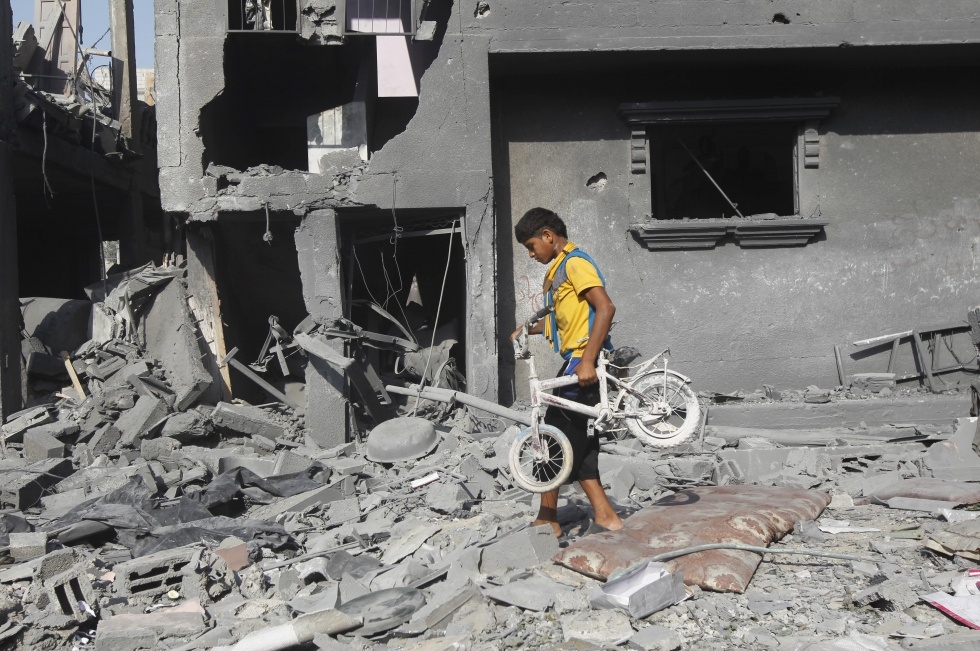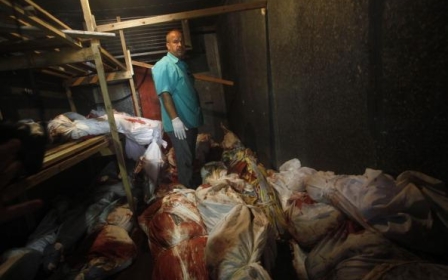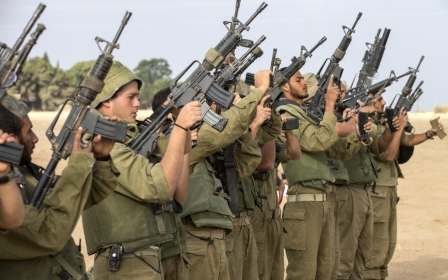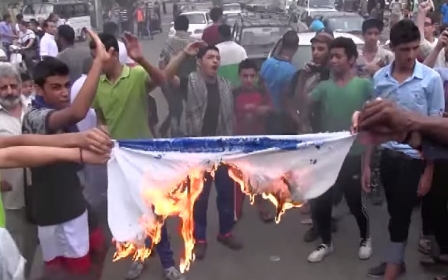Israel signals possible ground withdrawal as Gaza bombardment continues

As bombs continued to rain down on the Gaza Strip into the evening on Saturday, Israel announced that it will no longer seek a ceasefire with Hamas, and may instead withdraw unilaterally from its operation in Gaza.
There are reports that Sunday will see the Israeli army announce its success in destroying all of what Prime Minister Benjamin Netanyahu calls “terror tunnels.”
Troops are already beginning to pull back from their positions in the Gaza Strip, with an unspecified number of soldiers withdrawing to posts just inside the current border with Israel according to news site Times of Israel.
The news comes on the back of Friday’s failed 72-hour ceasefire, as each side accuses the other of breaking the truce almost immediately after it began.
Senior Israeli officials said after a five-hour security cabinet meeting on Saturday that they will not negotiate with Hamas, even through a mediator, and will not be sending a delegation to Cairo to engage in talks.
Members of the Palestinian delegation have already set off and are due to start arriving in Cairo on Saturday evening.
However, representatives of Hamas have been unable to travel due to the security situation in Rafah, according to senior Fatah official Azzam Ahmed.
Instead of engaging in the coming round of talks in Cairo, Israel hinted that it could withdraw unilaterally from the Gaza Strip in the coming days.
The Israeli army announced on Saturday morning that it has come “very close” to destroying all tunnels into Israeli territory.
An official quoted in Haaretz said that the next 48 hours will be crucial, with the army making further decisions “as we progress.”
According to the paper, several suspected sites of tunnels will be targeted in the coming hours, with one further site to be struck in the next 24-hour period.
Later in the day, the security cabinet left its options open, continuing to stress its commitment to “the principle of calm for calm.”
"If we feel that deterrence has been achieved, we will leave the Strip based on the principle of calm for calm," a senior official said.
"If we feel deterrence has not yet been achieved, we will continue the operation in the Gaza Strip, or leave and press on with aerial strikes."
Deadly strikes continue on Saturday
Aerial strikes on Saturday afternoon killed at least a dozen more Palestinians on Saturday afternoon, reported Maan News Agency.
Added to the 73 people killed overnight, the deaths on Saturday bring the official toll among Gazans to 1,670, more than the number who died during the 2008-9 and 2012 operations in Gaza combined.
This toll is not up to date, as Gaza’s Health Ministry stopped publishing casualty statistics on Saturday – numbers of the dead were rising continuously as medical teams pulled bodies from the rubble in Rafah, spokesperson Ashraf al-Qudra reported.
Agricultural land near Beit Lahiya, a town in the northern Gaza Strip, was bombed on Saturday evening.
The strike came hours after the Israeli army announced that it would be safe for residents of Beit Lahiya to return to their homes at 14:00 local time (11:00 GMT).
On the southern border of the Gaza Strip, Rafah city saw continuing shelling throughout the day.
At least 14 people were killed, with many others unaccounted for in the tally.
There are reports that al-Kuwaiti Hospital in Rafah city is at breaking point, with only one operating theatre and over 400 injured people needing treatment.
It is one of the only medical facilities currently operating in the city, after the evacuation bombing of Abu Youssef al-Nujjar Hospital on Friday.
A commenter on the ground in Rafah called the period of relative calm on Saturday evening “the lull before the storm” - further bombing is expected this evening and into the night.
By 19:20 local time (16:20 GMT), that period of calm seemed to be over, at least in Gaza City, with a commenter reporting explosions and decoy flares dropped by F16 fighter jets.
“Failure of the ground invasion”
Israel’s suggestion of its intent to withdraw from the Gaza Strip unilaterally prompted Gazan officials to announce “the failure of the ground invasion and the defeat of the occupying army.”
A statement issued by Palestinian Interior Ministry spokesperson Ayyad al-Buzm predicted “the withdrawal of Israeli troops and equipment and their exit from the Gaza Strip under a hail of resistance missiles.”
Earlier in the day, Hamas leader Mahmoud al-Zuhar said that “The [Israeli security] cabinet's decision not to send a delegation to Cairo confims to our people that resistance is the only possible way to end the occupation."
Speaking after the announcement of a possible withdrawal, Hamas spokesperson Sami Abu Zuhri spiked Israeli claims to success in destroying the majority of the tunnels.
"Netanyahu can't completely destroy our rockets stockpile or our tunnels…the victory Israel is talking about is fictitious."
"The occupation must choose, and then pay the price. It either stays in Gaza and pays the price, or unilaterally withdraws and pays the price - or it holds negotiations and pays the price. We're ready for all of these possibilities."
New MEE newsletter: Jerusalem Dispatch
Sign up to get the latest insights and analysis on Israel-Palestine, alongside Turkey Unpacked and other MEE newsletters
Middle East Eye delivers independent and unrivalled coverage and analysis of the Middle East, North Africa and beyond. To learn more about republishing this content and the associated fees, please fill out this form. More about MEE can be found here.




